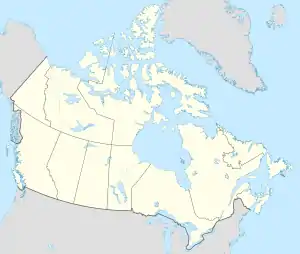Same-sex marriage in Yukon
Same-sex marriage in Yukon has been legal since July 14, 2004, immediately following a ruling from the Supreme Court of Yukon. The territory became the fourth jurisdiction in Canada (and the seventh worldwide) to legalise same-sex marriage, after the provinces of Ontario, British Columbia and Quebec.[1] Yukon was the first of Canada's three territories to legalise same-sex marriage, and the only one to do so before the federal legalisation of same-sex marriage in July 2005 by the Parliament of Canada.
| Part of the LGBT rights series |
|
|
Court ruling
In July 2003, Justice Minister Elaine Taylor said the government was taking a "wait-and-see" approach to same-sex marriage in Yukon.
In June 2004, Rob Edge and Stephen Dunbar brought suit, in Dunbar & Edge v. Yukon (Government of) & Canada (A.G.), against the Yukon Government after being refused a marriage licence in Whitehorse in January.[1] Their lawyer, Jim Tucker, used a novel approach: rather than arguing on the basis of Section 15 of the Canadian Charter of Rights and Freedoms as in the previous cases, he argued that the Federal Government's failure to appeal the decisions legalising same-sex marriage in Ontario, British Columbia and Quebec signalled a change in Canadian common law regarding marriage.
On July 14, 2004, Supreme Court Justice Peter McIntyre agreed that the Federal Government was inconsistent in its approach to the definition of marriage, a federal responsibility, since it had not appealed the first three decisions. Therefore, the territory's failure to provide marriage licences to same-sex couples meant that the law was being inconsistently applied in Yukon. Justice McIntyre declared same-sex marriages legal in Yukon, and ordered the government to issue a marriage licence to Mr. Edge and Mr. Dunbar.[2]
The judge obtained verbal promises from the Yukon Government that the couple would be granted a marriage licence. Premier Dennis Fentie praised the ruling. Laurie Arron, from Egale Canada, said,
This ruling sends a message that governments across the country must now accept the Charter rights of same-sex couples to marry in a civil ceremony. There is one law for the whole country, and that law includes same-sex couples.
Territorial legislation
In May 2002, the Yukon Legislative Assembly approved a bill allowing same-sex couples to adopt children jointly.[3][4] The law took effect on 1 January 2003.[5]
In December 2014, the Assembly amended the territorial Marriage Act (French: Loi sur le mariage)[lower-alpha 1] to replace references to "husband and wife" with "spouses" and add "or spouse" in section 13.[6] The amendments received royal assent by Commissioner Doug Phillips on 11 December and took effect on 1 June 2015.[5] The Act states:
If a marriage ceremony is performed by a marriage commissioner [...] (b) each of the parties shall, in the presence of the marriage commissioner and the witnesses, say to the other party: "I call upon these persons here present to witness that I,______________, do take thee, ______________ to be my lawful wedded husband (or wife or spouse)." [RSY 2002, c.146, s.13]
Further legislation, the Equality of Spouses Statute Law Amendment Act 2018, was passed by the Assembly in October 2018. It replaced references to "husband and wife" and "a man and a woman" with gender-neutral language in other acts, including the Evidence Act and the Family Property and Support Act.[7] The law was assented by Commissioner Angélique Bernard.
Marriage statistics
44 same-sex couples married in Yukon between July 2004 and July 2014.[8] The 2016 Canadian census estimated that there 70 same-sex spouses living in Yukon, with 55 (78.6%) being women.[9] The census also showed that about 1.9% of Whitehorse women in couples were in same-sex relationships; the second highest in Canada after Yellowknife in the Northwest Territories. Men in same-sex couples accounted for 0.7% of men in couples.[10]
Religious performance
In July 2019, the synod of the Anglican Church of Canada passed a resolution known as "A Word to the Church", allowing its dioceses to choose whether to perform same-sex marriages.[11] The canons of the Diocese of Yukon do not explicitly prohibit same-sex marriages, and one of the only mentions to marriage defines it as being "between two people".[12] The former bishop, Larry Robertson, who retired in 2019, was vocally opposed to same-sex marriage.[13]
Notes
- Gwichʼin: Nihkhàgadhidii geenjit dàgwìdįįʼee, pronounced [nɪ́hxə̀kə́ðɪ́tíː kéːntʃɪ́tʰ tə̀kʷɪ̀tĩːʔéː]
References
- "Same-sex marriage in the Yukon Territory, Canada". Kingston: Ontario Consultants on Religious Tolerance. 20 November 2005. Retrieved 11 March 2011.
- "Same-sex marriage ruled legal in Yukon". CTV. 15 July 2004. Archived from the original on June 29, 2011. Retrieved 11 March 2011.
- 30th Legislature, May 8, 2002
- Child Care Act
- Table of Public Statutes Part 1
- "ACT TO AMEND THE MARRIAGE ACT" (PDF). Government of Yukon. Retrieved April 19, 2015.
- "Equality of Spouses Statute Law Amendment Act 2018" (PDF). laws.yukon.ca.
- A decade of marriage equality in the Yukon. Yukon News, 25 July 2014
- "Families, Households, and Marital Status - Yukon Bureau of Statistics" (PDF). Yukon Bureau of Statistics. 2016.
- Yellowknife, Whitehorse have more same-sex female couples per capita than any other city in Canada. CBC, 4 August 2017
- Zeidler, Maryse (13 July 2019). "Anglican Church rejects same-sex marriage approvals in vote". CBC News.
- "Ordinance, Constitution, and Canons of the Diocese of Yukon" (PDF). Diocese of Yukon.
- "Joy, sadness over proposed marriage canon change". Anglican Journal. 8 July 2013.
External links
- "Same-sex marriage in Yukon, Canada". Religious Tolerance.
- "Dunbar & Edge v. Yukon & Canada 2004 YKSC 54 - text of the ruling". canlii.org.
